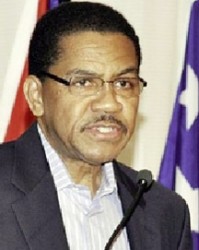President of the Caribbean Shipping Association (CSA) Grantley Stephenson has challenged Guyana to develop its ports in order to take full advantage of the economic opportunities that are being made possible by other infrastructural development regionally and internationally.
He was at the time delivering the feature address at the Shipping Association of Guyana’s annual dinner and awards presentation held at the Guyana Pegasus on Friday night.
Stephenson lauded the SAG for forging alliances in a relatively short time and said that this will lead to consensus on a number of initiatives that are absolutely necessary if Port Georgetown is to become the modern, efficient, world standard facility. “This year – 2013 – will no doubt be a watershed year…the fact that the SAG is working with the Maritime Administration Department (MARAD)…is a significant step in the right direction,” he said.

“The development of Port Georgetown is crucial to Guyana,” he said. But he noted that major development projects never move as fast as one hopes or expects, especially when such development is dependent on forging of alliances with a cross-section of stakeholders.
Stephenson expressed the hope that the SAG’s wishes for the dredging of the Demerara Channel become a reality since it would be a project of great importance for the development of the industry. “This initiative of yours to modernise the Georgetown port should not be seen by the people of Guyana as a mere shipping project,” he said.
He said that the real beneficiaries of the project would be the people of the country. “It is important that people in Guyana understand that this development is not about narrow self interests but about economic development of their country and investment that will bring real benefit for their children and their children’s children,” he said.
He said that it is no secret that well-developed ports and harbours yield rich dividends for people in a given country. He noted the initiatives to expand the Panama Canal and develop major ports in the region,
Speaking to the benefits of coming together, he said that some years ago the port of Kingston was nothing like it is today. He said that there were a small number of family owned companies on the waterfront. “They decided to come together and 17 companies together now form Kingston Wharves which is traded on the stock market. Today we have 2,000 shareholders with the largest bank in Jamaica being the lead shareholder,” he said, adding that the entity was able to pay two dividends based on its positive results last year.
He challenged the shipping companies in Guyana to consider such a consolidation to strengthen the industry.
In making remarks at the dinner, President of the SAG Desmond Sears said that during 2012, the SAG was able to engage with many different stakeholders in the industry to develop a common strategy to improve operating standards within the industry. “To achieve this we developed a Port Development Concept Paper and circulated it throughout the public and private sector. This led to the establishment of a working group to secure the necessary funding for capital works. This included dredging to deepen the channel and the installation of new modern infrastructure and navigational aids in the Georgetown harbour,” he said.
He said that the working group has been given the responsibility to examine the quality of service being provided in Port Georgetown and then propose options for modernisation that would satisfy the present and future needs of the industry. He said that the group also looked at efficient management of the port, revenue streams and the legal implications of delegating some of MARAD’s functions to a private entity.
“For a number of years, SAG has been voicing its concerns about the severe limitations the Demerara ship’s channel imposes on maritime commerce on the whole. “The draught places restrictions on the size and weight of vessels and cargo going in and leaving the port. It has had a negative impact on shippers and the commercial and public sectors, including GuySuCo,” he said.
He noted that some Caribbean and international markets have been lost or reduced because cargo vessels could only take out limited volumes of cargo. He said that this was also true for inbound cargo. As a result of the restrictions, freight costs have been affected.
He said that for 2012 approximately 66,000 TEUs or 20 foot equivalent units, moved through the port, marking an increase of 21 percent over the last four years. “It is possible that this figure rises to 80,000 TEUs by 2017. We are optimistic that if the proposals for overland transhipment or cargo from Brazil come to fruition, containerised cargo flow to and from Georgetown could multiply,” he said.
The Private Sector Commission has also been lobbying the government for a plan to address the shortcomings of Port Georgetown and its impact on business competitiveness.
Speaking in place of President Donald Ramotar who was unable to attend, Minister of Works Robeson Benn said that Government was making a lot of investment in public infrastructure and it was now time for the private sector to step up and help finance some of the needed infrastructure.





